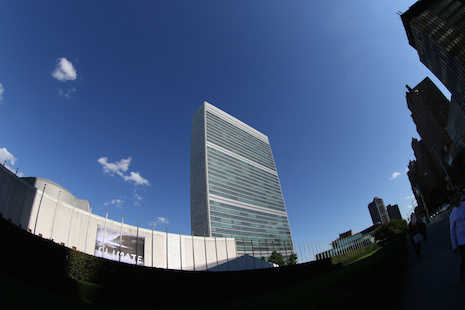
U.N. headquarters in New York City. Pope Francis will give a speech at the U.N. during his Sept. 22-27 visit to the United States. (CNS photo/Gregory A. Shemitz)
Pope Francis' address to the U.N. General Assembly Sept. 25 will mark the fifth papal speech delivered directly to representatives of the world's governments.
His address will come almost 50 years to the day — Oct. 4, 1965 — when Blessed Paul VI became the first pontiff to speak to the General Assembly in what has become a hallmark of recent papal history.
While the exact content of Pope Francis' message will not be revealed until he delivers his address, it's almost assured that topics revolving around human dignity that form the foundation of Christian life — concern for poor and marginalized people, migrants seeking security, care for the environment — will be prominent themes in his speech.
Pope Francis' three predecessors who spoke to the General Assembly — Blessed Paul VI, St. John Paul II and Pope Benedict XVI — addressed issues reflecting the great social and political challenges of their era. There is no reason to believe Pope Francis will change course, especially at a time when the world is confronting serious challenges to the well-being of humanity.
Blessed Paul VI made history in 1965, as the Second Vatican Council was ending, when he became the first pope to address the U.N. Outside of the significant changes that were about to remake the Catholic Church, the world was in the midst of the Cold War and the threat of nuclear war formed the backdrop of Blessed Paul's concerns.
Pointing to the U.N.'s charter, which identified the unification of countries for the betterment of humanity as a primary purpose of the world body, Blessed Paul urged the world leaders to "make yourselves equal" in an attempt to overcome pride, which leads to conflict and even war.
"Let no one as a member of your organization be superior to others; not one over the other. This is the formula for equality.... Not that you are all equal, but here you make yourselves equal. And it may well be that for a number of you this calls for an act of great virtue," Blessed Paul said.
From there, quoting President John F. Kennedy, Blessed Paul urged the world representatives to put an end to war: "Mankind must put an end to war, or war will put an end to mankind."
Human rights
At the 34th U.N. General Assembly on Oct. 2, 1979, St. John Paul held up the Universal Declaration of Human Rights as the basis for all action by the world body. He argued that each man and woman is "endowed with dignity as a human person, with his or her own culture, experiences and aspirations, tensions and sufferings and legitimate expectations."
Referencing the declaration, he said, "This document is a milestone on the long and difficult path of the human race. The progress of humanity must be measured not only by the progress of science and technology, which shows man's uniqueness with regard to nature, but also and chiefly by the primacy given to spiritual values and by the progress of moral life."
He also questioned the morality of the arms race involving both conventional and nuclear weapons. He said the willingness of nations to seek new and more sophisticated weapons shows "that there is a desire to be ready for war and being ready means being able to start it."
In St. John Paul's way of thinking, war was an affront to human dignity and infringed upon basic human rights.
Addressing the General Assembly a second time, Oct. 5, 1995, on its 50th anniversary, St. John Paul had seen that the nuclear tensions of the Cold War-era had eased. However, ethnic tensions in places such as the Balkans and Central Africa as well as the rise of armed insurgencies seeking to impose strict Islamic law throughout the Middle East had emerged.
Acceptance of differences among people and cultures became one of St. John Paul's key messages to the U.N. He again held up the Universal Declaration of Human Rights as the guide for world action. Stressing the "fundamental commonality" among people, St. John Paul called for a sense of solidarity with persecuted people to emerge in U.N. deliberations.
He also issued a call for the world body to build a "family of nations" that would lead to "mutual trust, mutual support and sincere respect."
Globalization
Pope Francis' predecessor, Pope Benedict, addressed the U.N. April 18, 2008, during his only trip to the United States. Pope Benedict took the themes of early papal addresses and reiterated the call for the respect of human dignity, religious freedom and the just distribution of goods to build the human family.
Concern for the lack of "integral development" of African and other unspecified nations as globalization swept the world was the first major concern Pope Benedict discussed in his address. He said many nations were "at risk of experiencing only the negative effects of globalization".
He said religious freedom in particular must be upheld because of the great contribution of religious belief to humanity and history.
He also called for the U.N. to promote human rights as "the most effective strategy for eliminating inequalities between countries and social groups and for increasing security".
As a priest from the developing world, Pope Francis will likely build on these themes and offer his own views on contemporary concerns based on his experiences with the poor and vulnerable in his native Argentina.


